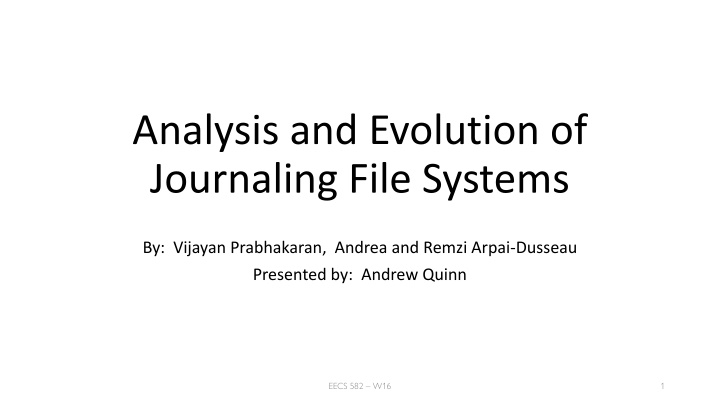
Analysis and Evolution of Journaling File Systems Overview
Delve into the in-depth exploration of journaling file systems with a focus on Ext3 analysis and innovative tools. Discover the background, performance improvements, and key aspects of journaling modes. Dive into contributions like Semantic Block Analysis and Semantic Trace Playback, evaluating design changes and traditional file system analysis for full system performance.
Download Presentation

Please find below an Image/Link to download the presentation.
The content on the website is provided AS IS for your information and personal use only. It may not be sold, licensed, or shared on other websites without obtaining consent from the author. If you encounter any issues during the download, it is possible that the publisher has removed the file from their server.
You are allowed to download the files provided on this website for personal or commercial use, subject to the condition that they are used lawfully. All files are the property of their respective owners.
The content on the website is provided AS IS for your information and personal use only. It may not be sold, licensed, or shared on other websites without obtaining consent from the author.
E N D
Presentation Transcript
Analysis and Evolution of Journaling File Systems By: Vijayan Prabhakaran, Andrea and Remzi Arpai-Dusseau Presented by: Andrew Quinn EECS 582 W16 1
Outline File System Background Description of novel tools Analysis of Ext3 EECS 582 W16 2
Background of File Systems Improve Performance Fast Crash Recovery Unix File System Journaling File System Fast File System EECS 582 W16 3
Journaling File System 1. Meta-data for file 2. Write hello world 3. Write commit Write hello world to file Client Journaling File System Journal Fixed-block FS EECS 582 W16 4
Journaling FS What should we write to the journal? Meta-data? Actual data? When should we `commit data to the journal? After each journal entry? After the data is written to the disk? EECS 582 W16 5
Journaling modes (ext3) EECS 582 W16 6
Contributions Semantic Block Analysis (SBA) Semantic Trace Playback (STP) An analysis of journaling file systems using SBA An evaluation of design changes to ext3 using SBA EECS 582 W16 7
Traditional FS analysis Synthetic/real workload Programmer System Full system performance EECS 582 W16 8
SBA analysis Targeted synthetic workload Programmer SBA Block-level tracing Semantic info EECS 582 W16 9
SBA analysis Block-level analysis: Block number understand seq. or random access Timing of each block - understand bursts of traffic Semantic information: Distinguish between journal blocks and in-place data EECS 582 W16 10
SBA Implementation Implemented as a pseudo-device driver Slight customizations for each File system EECS 582 W16 11
STP Block level trace High level FS ops STP Performance estimate EECS 582 W16 12
Ext3 `Basic Behavior EECS 582 W16 13
Ex3 and Concurrency EECS 582 W16 14
Ex3 in Ordered mode EECS 582 W16 15
Ext3 and STP Evaluate changes to key characteristics: Journal location Transaction grouping Timing Adaptive journaling Journal contents EECS 582 W16 16
Journal Location EECS 582 W16 17
Untangling Transaction Groups EECS 582 W16 18
Timings EECS 582 W16 19
Ext3 and STP Adaptive Journaling Mode Ordered: 83.39 Data: 86.67 Adaptive 51.75 Journaling contents Write data block differences into journal Size reduction by factor of 200 for TPC-B Size reduction by factor of 6 for TPC-C EECS 582 W16 20
Conclusion We can leverage SBA to understand the semantic behavior of a journaling FS We can leverage STP to predict the effect of algorithmic changes to a journaling FS EECS 582 W16 21






















